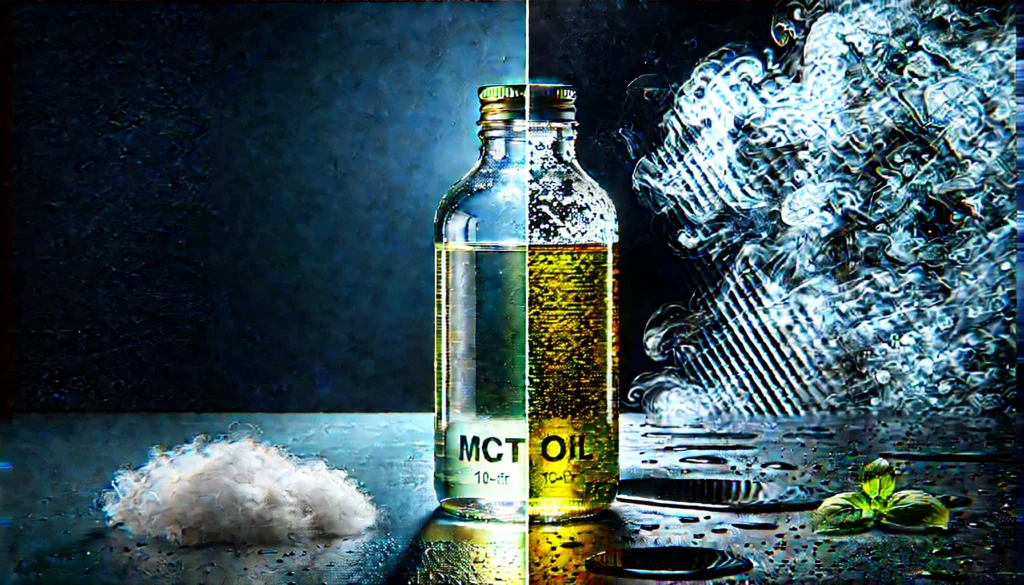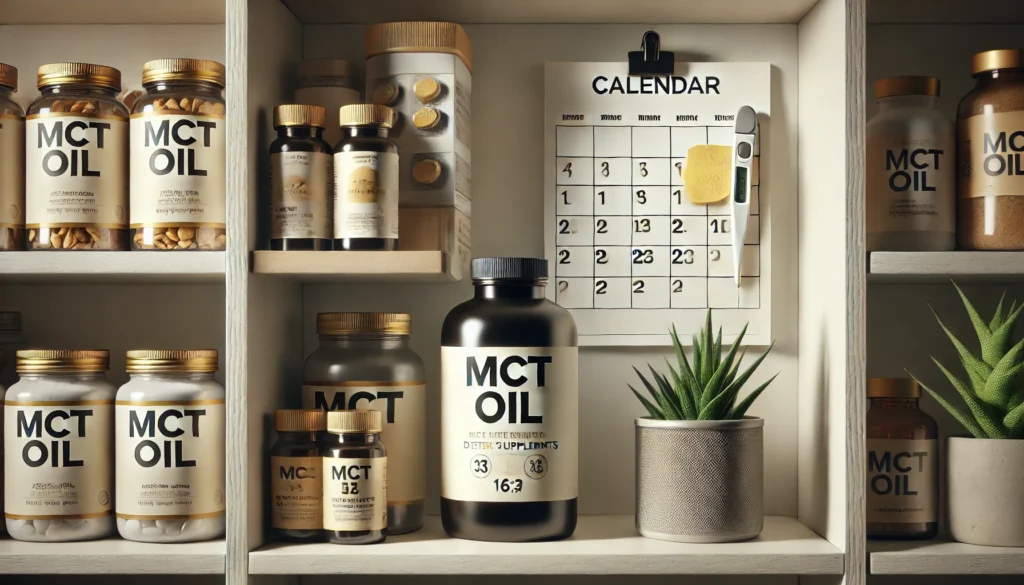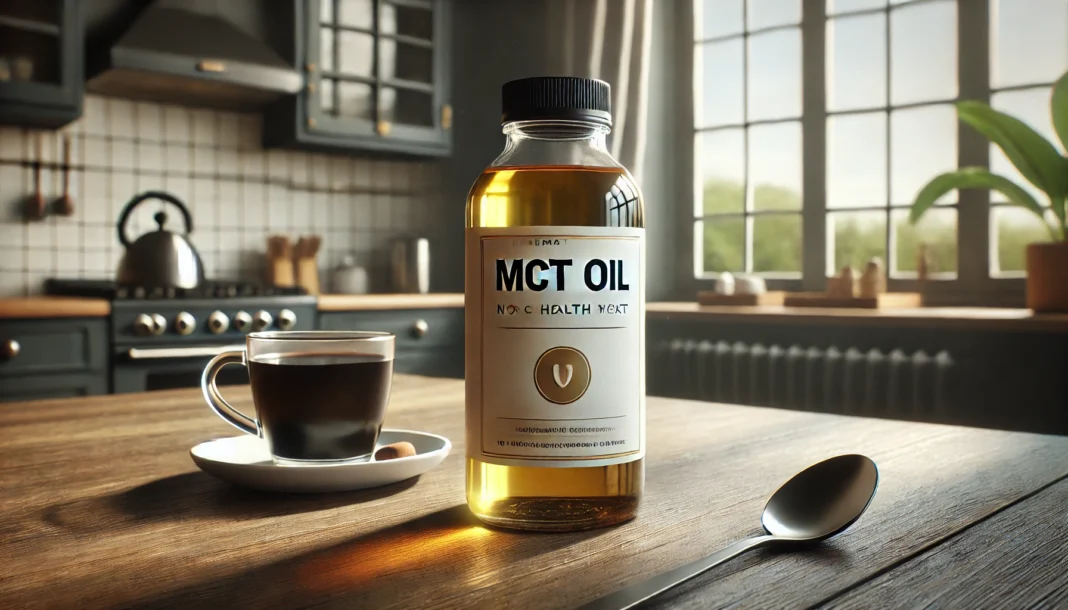Introduction
Medium-chain triglyceride (MCT) oil has gained widespread popularity in the health and wellness world for its unique metabolic benefits, rapid energy production, and ability to support ketogenic and low-carb diets. From bulletproof coffee blends to pre-workout energy boosters, MCT oil is now a staple in many kitchens and supplement routines. But as with any dietary oil or supplement, a question naturally arises for mindful consumers: does MCT oil go bad, and how long does MCT oil last once opened or stored over time?
You may also like: MCT Oil for Dementia and Brain Health: Exploring Its Role in Memory, Function, and Alzheimer’s Support
Understanding the shelf life, storage requirements, and spoilage potential of MCT oil is crucial not only for maintaining its efficacy but also for ensuring safe and beneficial use. While MCT oil is known for its high stability compared to other oils, like flaxseed or fish oil, that doesn’t mean it lasts forever. Improper storage, exposure to light, heat, or contamination can all affect the quality and longevity of MCT oil—even leading to spoilage if left unchecked.
This article provides an in-depth, science-backed guide to everything you need to know about MCT oil’s shelf life, including detailed answers to pressing questions like “how long does MCT oil last if refrigerated or kept at room temperature?” and “does MCT oil go bad if stored past its expiration date?” We’ll also explore what factors influence the degradation process, how to identify rancid oil, and the best practices for extending your MCT oil’s potency and freshness for as long as possible.
Whether you’re new to using MCT oil or a seasoned keto enthusiast with several bottles in your pantry, this guide will help you store and use your oil with confidence, backed by nutritional science and storage safety principles. Let’s explore how to keep this powerful fat source working for your body—and not against it.

What Is MCT Oil and Why Its Stability Matters
MCT oil is a purified supplement made from medium-chain triglycerides—fats composed of chains of 6 to 12 carbon atoms. Unlike long-chain triglycerides found in most oils and fats, MCTs are metabolized more efficiently, bypassing the digestive system and heading straight to the liver to be converted into energy. The most common types of MCTs include caproic acid (C6), caprylic acid (C8), capric acid (C10), and lauric acid (C12), though C8 and C10 are most often used in concentrated oil formulations due to their superior ketogenic properties.
Because MCT oil consists mainly of saturated fats, it is far more resistant to oxidation than polyunsaturated oils like soybean, canola, or flaxseed oil. Saturated fats have no double bonds, which means fewer vulnerable sites for oxidative damage. This structural trait is one of the key reasons that MCT oil is often said to have a long shelf life. But does that mean it lasts indefinitely? Not quite.
Despite its relative stability, MCT oil can still degrade under certain conditions. Factors such as exposure to oxygen, UV light, heat, or moisture can accelerate oxidation, leading to changes in taste, color, smell, and efficacy. The degradation of lipids may also create harmful byproducts if the oil is consumed well past its optimal storage time.
Thus, understanding how long does MCT oil last and under what conditions it might spoil becomes essential to both health safety and maintaining maximum nutritional value.

Does MCT Oil Go Bad Over Time?
The short answer is yes—MCT oil does go bad, although it takes longer to spoil compared to other oils due to its saturated nature. Over time, MCT oil can become rancid, particularly if stored in suboptimal conditions. Rancid oils are not only unpleasant in smell and taste but can also carry oxidized compounds that may have pro-inflammatory effects on the body.
Even though MCT oil contains primarily saturated fat molecules, which are more stable, it is not completely immune to degradation. Just like any other natural oil, it has a finite shelf life. Once opened and exposed to oxygen and environmental variables, the oil slowly begins to break down.
So, how long does MCT oil last under average use? When stored properly, unopened MCT oil can last up to 2 years from the manufacturing date. Once opened, it is best consumed within 6 to 12 months for optimal potency and taste, though some products may retain freshness up to 18 months if stored correctly.
Many people assume MCT oil will last indefinitely if it’s “just fat” or if it’s derived from coconut oil (known for its long shelf life), but even coconut-derived MCT oil can lose quality if kept in warm or humid environments. That’s why it’s vital to consider proper storage techniques and recognize the signs of spoilage.
How Long Does MCT Oil Last? Factors That Affect Shelf Life
Determining exactly how long does MCT oil last depends on several environmental and handling factors that can accelerate or slow its oxidation process. These include:
1. Packaging Material: MCT oil stored in dark glass bottles tends to last longer than those in clear plastic containers. Amber or opaque bottles block light exposure, preserving the oil’s integrity.
2. Storage Temperature: MCT oil should be kept in a cool, dry place—preferably at room temperature or below 77°F (25°C). Exposure to heat can catalyze oxidation and reduce shelf life significantly.
3. Air Exposure: Repeatedly opening and closing the bottle introduces oxygen, which slowly starts the oxidation process. Using a clean, tightly sealed cap and minimizing air exposure can extend the oil’s life.
4. Light Exposure: UV light is a known catalyst for oxidative reactions in lipids. Storing the oil away from sunlight, such as in a cabinet or pantry, helps maintain freshness.
5. Contamination: Using a dirty spoon or pouring the oil into contaminated containers can introduce bacteria or moisture that promote spoilage.
Given these factors, how long does MCT oil last in a pantry can vary, but most high-quality brands offer shelf stability between 18–24 months unopened and around 6–12 months once opened. Checking the manufacturer’s label is essential, as some brands may recommend refrigeration after opening—though this is usually optional.

Signs That Your MCT Oil Has Gone Bad
Recognizing whether MCT oil has gone bad is essential to avoid consuming a product that may no longer be effective—or worse, potentially harmful. Spoiled oil won’t offer the same nutritional benefits and could cause digestive upset in sensitive individuals. Here’s how to tell if your MCT oil is past its prime:
Smell:
Fresh MCT oil is usually odorless or has a very faint, neutral scent. If the oil begins to emit a sour, musty, or chemical smell, it is likely rancid.
Taste:
Spoiled MCT oil often has a sharp, bitter, or metallic aftertaste. If your oil tastes off or unpleasant, do not continue consuming it.
Appearance:
While MCT oil is naturally colorless or pale yellow, changes in hue or the presence of cloudiness, floating particles, or sludge may indicate microbial contamination or oxidation.
Texture:
Fresh MCT oil is light and smooth. A sticky or thickened consistency can signal degradation.
If you detect any of these signs, it’s better to discard the product—even if it hasn’t reached the printed expiration date. Remember that does MCT oil go bad is less about the date and more about the condition of the product based on how it’s been stored and used.

Proper Storage Tips to Maximize MCT Oil Freshness
To ensure you’re getting the most out of your investment, it’s important to implement best practices that extend the usable life of MCT oil. Here are expert-recommended strategies that help preserve quality:
Store in a Cool, Dark Place: Avoid keeping MCT oil near the stove, in sunny windowsills, or in hot cars. Choose a pantry or cupboard with consistent, moderate temperatures.
Use Airtight Containers: Always keep the original lid sealed tightly. If transferring to another container, use clean, dry, food-safe glass with a tight-fitting top.
Avoid Plastic for Long-Term Storage: If the oil was packaged in plastic, consider transferring it to a glass container if you won’t be using it quickly, as plastic can allow minimal oxygen and light exposure.
Do Not Freeze MCT Oil: While some people store oil in the fridge, freezing is not necessary and may change the texture. Room temperature is ideal unless otherwise specified by the brand.
Label and Date After Opening: Keeping track of the date you opened the oil can help you monitor freshness and avoid guessing later on.
When followed consistently, these practices help ensure that the answer to does MCT oil go bad remains “eventually, but not anytime soon”—as long as you care for it properly.
Frequently Asked Questions
1. How long does MCT oil last once opened?
Once opened, MCT oil typically lasts about 6 to 12 months if stored in a cool, dark place with the cap tightly sealed. Some brands claim their oil remains stable up to 18 months post-opening, but this can vary based on storage habits. Keeping the bottle away from heat and light sources is key to preserving its shelf life. Monitoring the oil for changes in smell, taste, or appearance is the most reliable way to ensure its ongoing quality and safety.
2. Does MCT oil go bad if not refrigerated?
No, refrigeration is generally not required for MCT oil, but it must be kept in a temperature-controlled environment away from heat and sunlight. Refrigerating the oil won’t harm it, but it may cause cloudiness or thickening, which can affect texture. Unless the manufacturer specifically recommends refrigeration after opening, storing MCT oil in a pantry or cupboard works well. Still, room temperature should be stable and not exceed 77°F (25°C) for prolonged freshness.
3. What are the signs that MCT oil has expired?
Spoiled or expired MCT oil may exhibit a sour or chemical odor, a bitter or metallic taste, or changes in clarity or texture. While it’s unlikely to become dangerous if consumed slightly past its expiration, degraded oil may cause stomach upset and won’t deliver the same nutritional benefits. If any unpleasant smells, tastes, or visual changes are present, it’s safest to discard the oil. Always trust your senses when checking for freshness.
4. Can you still use MCT oil after the expiration date?
The printed expiration date is an estimate of peak freshness and quality—not a strict safety cutoff. If stored properly, MCT oil can sometimes remain usable for weeks or even months after the date has passed. However, it’s important to evaluate the oil with your senses. If it still smells, tastes, and looks normal, it’s likely safe to use. If there’s any doubt, especially with older or improperly stored bottles, it’s better to replace the product than risk using rancid oil.
5. Will MCT oil solidify if stored in the fridge?
Yes, MCT oil may thicken or become cloudy if stored in a cold environment such as a refrigerator. This is not a sign of spoilage but simply a physical response to lower temperatures. Once brought back to room temperature, the oil will return to its clear, liquid state. If you notice persistent cloudiness even at room temperature, inspect for other signs of spoilage to rule out quality issues.
6. Can you freeze MCT oil to extend its shelf life?
Technically, you can freeze MCT oil, but it is not recommended. Freezing is unnecessary and can alter the consistency and pourability of the oil. MCT oil is inherently stable at room temperature due to its saturated fat content, so storing it in a cool, dark cabinet is sufficient. Overfreezing may even increase the risk of moisture introduction upon thawing, which could accelerate degradation if not handled properly.
7. Does flavored MCT oil expire faster than unflavored?
Flavored MCT oils often contain natural or artificial additives, which can reduce shelf life depending on the formulation. Natural flavors may degrade faster than pure oil, especially if not preserved with stabilizers. Always check the label for storage instructions and use-by dates. If you notice any separation, discoloration, or off-putting aromas in flavored versions, treat them as you would any potentially spoiled product and dispose of them accordingly.
8. How should I dispose of expired or rancid MCT oil?
Expired or spoiled MCT oil should not be poured down the sink, as it can contribute to plumbing or environmental issues. Instead, place it in a sealed, disposable container and throw it in the trash. If your area has a facility for hazardous waste or oil recycling, you may contact them for more eco-friendly disposal options. Never consume expired oil if there’s any sign of rancidity—it’s not worth the risk.
9. Does MCT oil oxidize like other cooking oils?
MCT oil is far more resistant to oxidation than polyunsaturated oils due to its high saturated fat content. However, it can still oxidize over time when exposed to light, air, or heat. This is why proper storage is crucial. Unlike oils like olive or flaxseed, which oxidize quickly and require refrigeration, MCT oil is stable for longer but not immune. Oxidized oil may lose nutritional value and potentially promote inflammation.
10. Are there storage differences between MCT powder and MCT oil?
Yes. MCT powder, which is made by spray-drying MCT oil with a carrier like acacia fiber or tapioca starch, is more stable and often has a longer shelf life than MCT oil. It typically doesn’t require refrigeration and is less prone to oxidation. However, it’s still important to store MCT powder in a cool, dry, and airtight container. Always check for caking, changes in smell, or discoloration before use, as these may signal spoilage or moisture intrusion.

Conclusion
MCT oil is a uniquely stable and powerful supplement, prized for its fast-acting energy benefits, brain-boosting properties, and support for ketogenic diets. However, like any natural product, it is not immune to the effects of time, light, and temperature. So, does MCT oil go bad? Yes—but with proper storage, it can last well beyond a year and continue delivering exceptional health benefits. Knowing how long does MCT oil last based on brand recommendations, storage environment, and handling habits helps ensure both safety and effectiveness.
Whether you’re an athlete, a dieter, or someone seeking better cognitive performance, understanding how to store and assess your MCT oil empowers you to make the most of this functional fat. Avoiding common storage mistakes, watching for spoilage signs, and tracking usage after opening can make a significant difference in your experience and results.
Remember, the quality of the supplements you use is just as important as the habit of taking them. Keep your MCT oil fresh, clean, and potent—and it will continue to work for you. And when in doubt, your senses are your best guide. A quick smell or taste can tell you more than a date on a label. Here’s to better storage, better nutrition, and better health.
Was this article helpful? Don’t let it stop with you. Share it right now with someone who needs to see it—whether it’s a friend, a colleague, or your whole network. And if staying ahead on this topic matters to you, subscribe to this publication for the most up-to-date information. You’ll get the latest insights delivered straight to you—no searching, no missing out.
Further Reading:
Does MCT Oil Go Bad? How To Maximize Freshness and Identify Bad Oil



